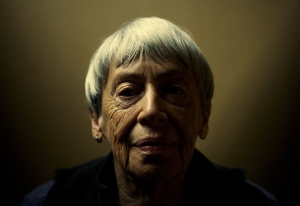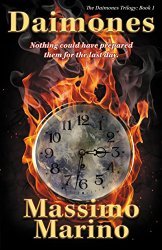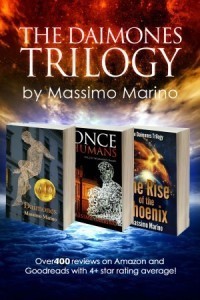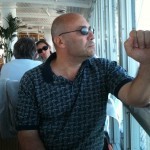Ursula Le Guin on “Where Do You Get Your Ideas From?”

Ursula K. Lu Guin by Benjamin Reed
In 1987, Le Guin addressed the eternal question in an essay titled “Where Do You Get Your Ideas From?,” found in the altogether fantastic 1989 collection of her speeches, essays, and reviews, Dancing at the Edge of the World: Thoughts on Words, Women, Places
The reason everyone ask that kind of question is because writers can’t answer. The reason those questions arise all the time rests on two myths:
The reason why it is unanswerable is, I think, that it involves at least two false notions, myths, about how fiction is written.
First myth: There is a secret to being a writer. If you can just learn the secret, you will instantly be a writer; and the secret might be where the ideas come from.
Second myth: Stories start from ideas; the origin of a story is an idea.
Le Guin writes:
I will dispose of the first myth as quickly as possible. The “secret” is skill. If you haven’t learned how to do something, the people who have may seem to be magicians, possessors of mysterious secrets. In a fairly simple art, such as making pie crust, there are certain teachable “secrets” of method that lead almost infallibly to good results; but in any complex art, such as housekeeping, piano-playing, clothes-making, or story-writing, there are so many techniques, skills, choices of method, so many variables, so many “secrets,” some teachable and some not, that you can learn them only by methodical, repeated, long-continued practice — in other words, by work.
[…]
Some of the secretiveness of many artists about their techniques, recipes, etc., may be taken as a warning to the unskilled: What works for me isn’t going to work for you unless you’ve worked for it.
She then turns to the second fallacy of the origin-of-ideas question, namely the notion of the “idea” itself:
The more I think about the word “idea,” the less idea I have what it means. … I think this is a kind of shorthand use of “idea” to stand for the complicated, obscure, un-understood process of the conception and formation of what is going to be a story when it gets written down. The process may not involve ideas in the sense of intelligible thoughts; it may well not even involve words. It may be a matter of mood, resonances, mental glimpses, voices, emotions, visions, dreams, anything. It is different in every writer, and in many of us it is different every time. It is extremely difficult to talk about, because we have very little terminology for such processes.
Le Guin speaks about the nature of the creative writing process:
I would say that as a general rule, though an external event may trigger it, this inceptive state or story-beginning phase does not come from anywhere outside the mind that can be pointed to; it arises in the mind, from psychic contents that have become unavailable to the conscious mind, inner or outer experience that has been, in Gary Snyder’s lovely phrase, composted. I don’t believe that a writer “gets” (takes into the head) an “idea” (some sort of mental object) “from” somewhere, and then turns it into words and writes them on paper. At least in my experience, it doesn’t work that way. The stuff has to be transformed into oneself, it has to be composted, before it can grow a story.
I’d say it fits well with me. At times, when I’m writing, I have the impression of having a mushy compost inside my head at the place of my brain. And, at times, the “idea” comes out.
Massimo Marino is a scientist envisioning science fiction. He spent years at CERN and The Lawrence Berkeley Lab followed by lead positions with Apple, Inc. and the World Economic Forum. He is also co-founder of “Squares on Blue”, a Big Data Analytics service company, and of BookGarage, a publishing service brokerage company.
Massimo currently lives in France and crosses the border with Switzerland multiple times daily, although he is no smuggler. #SFWApro
As a scientist writing science fiction, he went from smashing particles at accelerators at SLAC and CERN to smashing words on a computer screen. He is is now an author with Booktrope Publishing, LCC, and Active Member of SFWA – Science Fiction & Fantasy Writers of America.
smashing particles at accelerators at SLAC and CERN to smashing words on a computer screen. He is is now an author with Booktrope Publishing, LCC, and Active Member of SFWA – Science Fiction & Fantasy Writers of America.
He’s the author of multi-awarded Daimones Trilogy. The 1st volume, Daimones (The Daimones Trilogy Book 1) , published by Booktrope is available since August 2015.
, published by Booktrope is available since August 2015. 
 His novels have received the Seal of Excellency from both AwesomeIndies.net and IndiePENdents.org
His novels have received the Seal of Excellency from both AwesomeIndies.net and IndiePENdents.org
• 2012 PRG Reviewer’s Choice Award Winner in Science Fiction
• 2013 Hall of Fame – Best in Science Fiction, Quality Reads UK Book Club
• 2013 PRG Reviewer’s Choice Award Winner in Science Fiction Series
• 2014 Finalist – Science Fiction – Indie Excellence Awards L.A.
• 2014 Award Winner – Science Fiction Honorable Mention – Readers’ Favorite Annual Awards
His novels are available from Amazon, Barnes & Noble (Nook), iTunes Apple Store, and many other retailers around the world.
Join his mailing list for new releases, or follow him on Facebook, Google+, and Twitter.
The post Ursula Le Guin on “Where Do You Get Your Ideas From?” appeared first on § A Scientist Envisioning Science Fiction.




